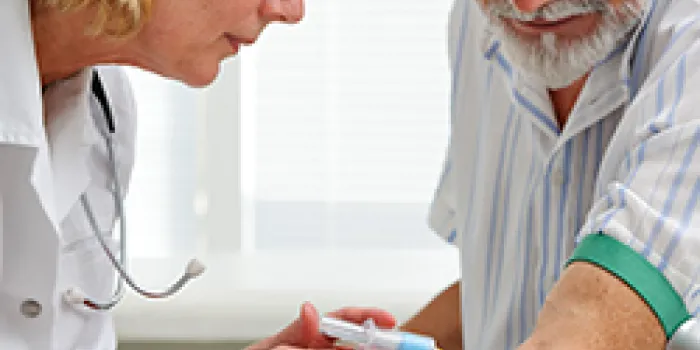The hemophilia community has always worked together to advance research. Now, we are well on our way to helping researchers and clinicians better understand connections between the disorder’s genetic cause and clinical outcomes. Thanks to your participation, My Life, Our Future (MLOF) has created the largest hemophilia genetic research repository. The MLOF Research Repository is a collection of data and samples from more than 7,000 people with hemophilia A and B, as well as potential and confirmed carriers.
A partnership between the American Thrombosis and Hemostasis Network (ATHN), Bloodworks Northwest, the National Hemophilia Foundation (NHF) and Bioverativ (formerly Biogen), MLOF offers free genetic testing, or genotyping, for people affected by hemophilia in the US. In addition to helping families understand more about the disorder, the program also provides participants with the option of contributing their genetic data and blood samples to its central research repository. “Thanks to the thousands of people who participated in My Life, Our Future, the dream of a brighter tomorrow is now a reality,” says NHF CEO Val D. Bias. “We hope that this resource will lead to new knowledge and advances that will impact generations to come.”
The MLOF Research Repository will allow researchers to explore long-unanswered questions about hemophilia, including why one person bleeds differently than another, and why some people react differently to the same treatment. The first round of applications to access the Repository were submitted in March for evaluation by an independent multidisciplinary review committee. Research projects will be selected based on scientific merit and overall benefit offered to the bleeding disorders community. A list of approved research programs will be made available on the MLOF website (MyLifeOurFuture.org) later this year, and NHF will continue to update the community on the program. International researchers will be able to apply to study the MLOF Research Repository data in 2018.
CONTINUED MOMENTUM: CARRIER TESTING
MLOF recently expanded to offer free genotyping to carriers and potential carriers as well. The scientific value of the MLOF Research Repository will be enhanced by the addition of data and samples from these individuals. “Providing genotyping to carriers and potential carriers will be beneficial from both a research and clinical perspective,” says Barbara Konkle, MD, associate chief scientific officer, Bloodworks Northwest, and principal investigator for MLOF. “It will increase our understanding of hemophilia inheritance and why carriers bleed, and may help improve care and treatment options for both women and men.”
Some of the key research questions we can help answer include:
- What are risk factors for bleeding?
- Why do some women show evidence of joint disease?
- What are the roles of von Willebrand factor and platelet function in controlling bleeding symptoms?
- Can we better define the risk of bleeding complications during and after childbirth?
Our community clearly recognized carrier testing as an unmet need. In fact, a 2013 survey of HTCs across the country indicated that 81% of respondents viewed genotyping as extremely valuable for carriers, and 95% of HTCs were interested in offering MLOF to these members of the hemophilia community. HTCs were most interested in recommending genotyping to identify potential carriers to help inform pregnancy decisions, and to help select birth and delivery approaches.
Following a pilot, the national expansion of carrier testing was announced at NHF’s 68th Annual Meeting in July 2016. HTCs across the country continue to come on board. MLOF aims to enroll 2,000 confirmed carriers in the MLOF Research Repository by the end of 2017, providing scientists with enough data and samples to study.
MLOF ELIGIBILITY
Both confirmed and potential carriers of hemophilia are eligible to be genotyped through MLOF, and can also choose to contribute to the MLOF Research Repository. Eligible participants include:
- Mothers of a child with hemophilia A or B
- Daughters of a father with hemophilia A or B (obligate carriers)
- Daughters of a mother with hemophilia A or B
- Siblings of a brother or sister with hemophilia A or B
- Females who have a second-degree relative (half sibling, aunt, uncle, grandparent) or third-degree relative (cousin, great-grandparent) with hemophilia A or B
To learn more about carrier testing and how you can participate in MLOF, visit MyLifeOurFuture.org. Together, we can make knowledge hereditary.

